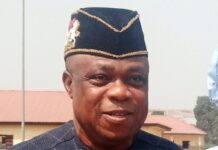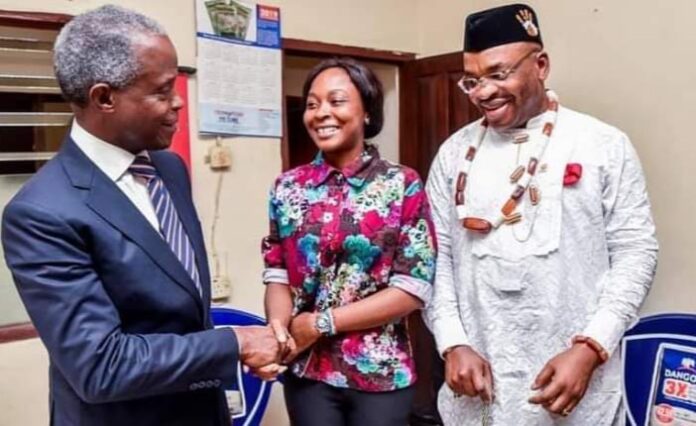
Ms. Ndueso Young, hosting the Vice President, Prof. Yemi Osinbajo and Mr. Udom Emmanuel, Governor of Akwa Ibom state inside a self-contained apartment in Odio, Eket local government area, Akwa Ibom State
Miss Ndueso Young, a Nigerian author, girl child and chasity advocate has shared an overwhelming story of how she unexpectedly hosted Nigeria’s Vice President Yemi Osinbajo and Governor Udom Emmanuel of Akwa Ibom State in her brother’s self-contained.
Ms. Young, is the author of two books, More Than Just a Girl, and Staying Chaste. She is a social entrepreneur and Psychologist. In September Prof. Osinbajo, and Governor Emmanuel, visited Ms. Young in her village, Odio in Eket local government, Akwa Ibom State to share thoughts with her on her works. Ms. Young spoke extensively with our Editor, Abasifreke Effiong, about her books and meeting with the Vice President. Excerpts:
People merely know you as Ndueso Young from Odio in Eket. Tell us more about yourself.
My name is Ndueso Young, a social entrepreneur, a psychologist, and she is also a girl child advocate. Why people merely know me as Ndueso Young from Odio, Eket local government area of Akwa Ibom State is because I started by advocacy in Eket. Everywhere I went to in Eket and Uyo, people always asked me, ‘where are you from?’ When I tell them that I’m from Odio, they will ask me where is that and I will have the burden of describing where Odio is situated. Those people who know the community would say ‘Ah! You are from that community?’ I think that’s basically why many people just know me and my community. And when I published More Than Just a Girl, I had to mention Odio in about the author because I wanted people to know that where you come from or your background doesn’t have much to do with who you will become.
What’s that unique thing about Odio community that gets people surprised that a fine talent like you can come from there?
It isn’t really something bad. Odio, I should say is a special community, in that, it is somewhat secluded and away from civilization. I think that’s why people are somehow surprised; like, ‘you mean you’re from that village that has no road?’. I think the community just had electricity four years ago. These are just the things that get people surprised that I am from Odio, not really anything negative. It’s a special area; let me add, that is secluded from this other part of the world (Laughs).
How did the setting and lifestyle in your community influence your early life as a girl?
Okay. I grew up in Odio as a little girl. I attended primary school at Qua Iboe Church school, Odio. While I was in primary school I had dreams and aspirations. I sat back and imagined the kind of life I wanted to live, I imagined the kind of woman I wanted to be, but then I noticed that there was a common denominator in my village which was that a lot of the girls who were older than me who were in secondary school would get pregnant and drop out of school. Majority of the girls never completed their secondary education. So for me, it was a burden in my heart and I think for two reasons. Number one, for the fear of ending up that way, and number two for the hate I had for poverty, so to speak. I noticed that these girls when they got pregnant, dropped out of school; they were living with their parents. Their parents were not doing well and here they are, pregnant, bringing additional burden to the family. Here I saw a vicious cycle of poverty. To me, that was not a lifestyle I wanted and I wouldn’t wish any girl child. I always knew there was something more than just being a girl. I knew there was a better life out there. What happens to finishing up your school, becoming a role model in society? Nobody really sat me down to tell me all those things but somehow it was just there in my head. I had to tell myself I have to be outstanding. It was me seeing girls getting pregnant, dropping out of school, their children not well catered for, the vicious cycle of poverty shaped me and propelled me to begin my early works in Port Harcourt, Rivers State, where I had my secondary education.
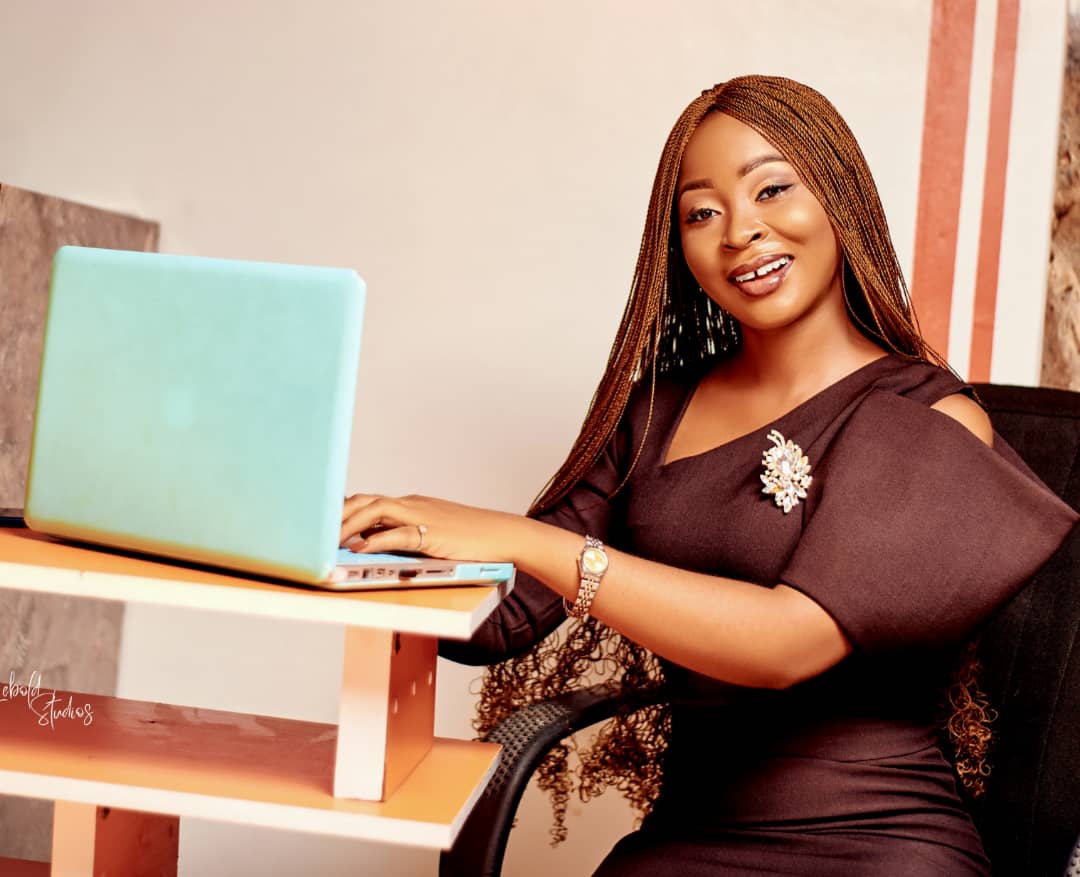 Miss Ndueso Young, author of Staying Chaste , and More Than Just a Girl.
Miss Ndueso Young, author of Staying Chaste , and More Than Just a Girl.
So, your experience as a teenage girl contributed to your first publication, Staying Chaste?
Exactly! It did really contribute. Because when I was in secondary school, my mom would visit me and would say ‘oh that primary school mate of yours, do you remember her? She is pregnant. Do you remember this one? She is pregnant’. It was negative stories about all the friends I had in primary school; everyone was getting pregnant and dropping out of school. So, I felt I needed to do something, I needed to send my message out there to the world. I needed to tell girls they don’t need sex at this point of their lives because I grew up to understand that whenever you have sex you get pregnant. So, I decided to publish Staying Chaste to teach those morales and values. I needed to encourage them to focus on themselves as Christians. God expects us to be more, better, other than messing ourselves around with people of the opposite gender. Also, as a young girl in secondary school I also had people who were making advances at me. In my head, I was like ‘oh these boys, what they do to girls is get them pregnant and leave you?’. So, such relationship was a ‘No’ for me. I always told myself I want to be a model to other young girls. That was the basis for my first publication, Staying Chaste.
How did your peers receive your message in Staying Chaste?
Oh wow! It was mind-blowing. I never anticipated that young people would receive the book that way. I never thought that Staying Chaste would make such strong positive impact in the lives of young girls and mothers. Mothers were thankful to me that I published the book. Some mothers gave me testimonials how my book was helping their daughters. The moment I published Staying Chaste, I launched an awareness and sensitization campaign. So, I was actually giving the books free of charge to students during my sensitization campaigns. For every school I went to, the reception was fantastic. A lot of young girls came and confided in me, some asked questions on how they can deal with pressures they were getting from the opposite sex. I was a teenager then, but I had to advise them that they don’t have to be rude to the boys but at the same time they should make their position known and clear. So, the reception was really amazing.
You started off a campaign on chastity in your local government area, how far have you gone with it?
I started that campaign in 2008. Between then and 2011, I was doing chastity and leadership campaigns, development summits, going from school to school. I had a break in 2012 when I left for Lagos state, since then I have been mostly in Lagos. Before I left for Lagos, I had reached out to a number of schools within and outside Akwa Ibom, including my alma mater in Rivers state because I discovered that teenage pregnancy was prevalent there too. From 2012, the bulk of the job was done in Lagos. There, we took the campaign to about seven schools with my colleagues at UNILAG. While in the University I didn’t do much campaigns on chastity anymore because it was like at every step of the way, I would discover a new path. People started calling me to talk on gender issues. My early days of advocacy were not really like we wanted to do gender issues but people started calling and said, ‘hey you do that, you can also do this, come and talk on this’. I saw that I had to till more grounds, get into leadership, gender violence and lots more. So, from chastity the work graduated into other much more works.
During your University education you had your colleagues buy into your campaigns. Are you still in touch with them? How far have they sustained the campaign?
After I finished university, I left Lagos to Eket before going for national youth service in Anambra state. So my colleagues then also moved. But when l was there, they helped out.
Let’s talk about your latest book, More Than Just a Girl. The Vice President, Prof Yemi Osinbajo, came to your village, Odio, to meet with you because of this book. How did that happen?
In 2019, September precisely, the Vice President came to identify with me for the works that I have been doing.
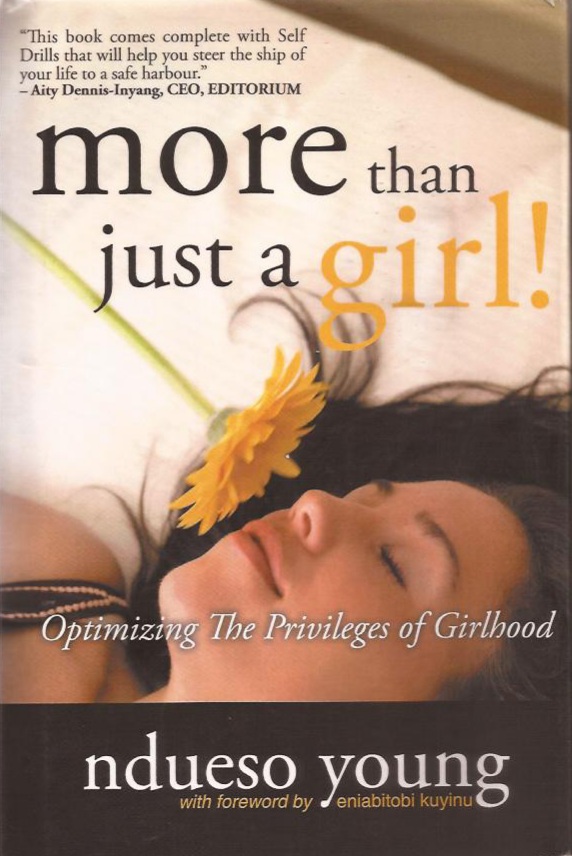 Cover of the book More Than Just a Girl.
Cover of the book More Than Just a Girl.
Was it on your invitation?
No. It was not on my invitation. I didn’t know what was going to happen. Okay, this was what actually happened. I received a call, the caller said, ‘I’m calling from the Office of the Vice President. We’ve seen your work, so can you tell us more about yourself?’ It was more like a phone interview and my response to one question led to another and more questions. In 2012, I won an award from the federal ministry of youths and sports development in Abuja, and during the chastity campaign I had a partnership with Youngsters Foundation in Abuja so I had opportunity of traveling to Abuja often and my work was featured on one of those photo books; so I actually thought it was one of those. I said OK they are just calling me maybe they have stumbled on something about me. I answered all the questions and they asked me. The caller had asked me, ‘where will you be this weekend?’ I told her I where I would be. She asked me what I knew about Odio, i told her Odio is my village. She asked me my address. After that she said, ‘thank you, we will call back in two days time’. Two days later, she called back and asked where I would be on Saturday, that they would like to come and see me. This was on Wednesday or Thursday, and I told her I would be in Odio. At the time I was still thinking maybe it was just one person that would come to see me, maybe to ask questions. On Saturday she called me and said, ‘Ndueso, you said your house is number…, a red gate, I’m here’. I was like, what! I thought she was going to call me before coming. When I stepped out of the house I saw her and one other guy, they spoke with me and made recordings. After speaking with me, she said, ‘you will see some security personnel come around, when you see them don’t be afraid, they will be coming to wait for me.’ When she was leaving, she said ‘we will come back again’. Don’t go anywhere today, just stay here. Dedicate your today to me’. I said OK ma, no problems. Not quite long after she left, I had a call, when I picked up the phone, the caller said, ‘hello, is this Ndueso? I am the DPO of Eket’. I was like, DPO? The DPO was like, ‘your house is …’ and I said, yes. He said, ‘I’m here’. I had to step out and receive them. There were security officers everywhere and I was wondering what was going on. The DPO and other security men came into my compound and went round. People kept coming, but I didn’t know what was going on. I only remembered that my caller from the office of the Vice President had said, ‘people will come, when they come receive them, they are coming on my directives.’
Just after that the lady came again the third time and she said, ‘Directors from my office are coming to see you’. Actually, the house I was staying was my brother’s mini-apartment, just a room, toilet and kitchen; what is called ‘self-con’. So, she told my brother to put a chair here, here and here. My brother put the chairs as she directed. She said ‘when my Directors come, you sit here, they would sit here’. So, obviously those two Directors where the VP and the Governor. I still did not know what was going on even though the guy that came with the lady was busy putting microphones and cameras here and there in the room. Suddenly, I had some loud noise outside and I was like, ‘Oh my God what’s happening outside?’ So, I asked the guy that came with the lady if he was sure people were not fighting on my street. He said I should go out and check. When I stepped out, here I was face -to – face with the Vice President and my Governor. I just screamed and welcomed them.
They walked in, the Vice President said ‘I have heard about you and I have seen your work, talk to me about it’.
How did you feel hosting the Vice President and your Governor in your brother’s ‘self-con’?
(Laughter) Okay, it was really overwhelming. You know that kind of surreal moment, where you are like, how do I behave, how do I act, what should I say, what should I not say? So I found myself trying to say, welcome sirs, welcome Your Excellencies, welcome daddies. I didn’t know exactly what to say. But it was a mix of positive emotions of surprise.
What did you tell the Vice President?
I basically said, welcome Your Excellency. They took their seats and asked me questions and I answered. In few minutes we were done. The Vice President said ‘Thank you’. When I got my breathe and wanted to ask a question, the Governor said something that made me say in my mind, Oh I hope I have not made a mistake? The lady that came told me to sit down and talk, but when the VP came and asked me questions, when I started answering the questions, the Governor said, ‘stand up’. I was like, Oh my God! Have I done something wrong? I was almost thrown off balance, but I re-comported myself and maintained my cool.
The VP said ‘thank you for having us. The lady who has been speaking with you would talk more with you’.
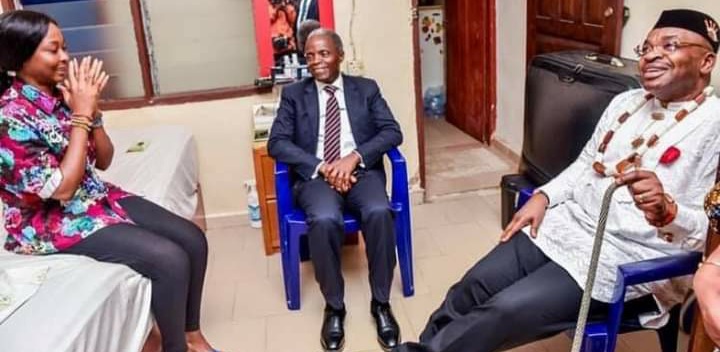 Ms. Ndueso sitting on a bed and discussing with the Vice President, Prof. Yemi Osinbajo and Mr. Udom Emmanuel, Governor of Akwa Ibom state inside a self-contained apartment in Odio, Eket local government area,Akwa Ibom State.
Ms. Ndueso sitting on a bed and discussing with the Vice President, Prof. Yemi Osinbajo and Mr. Udom Emmanuel, Governor of Akwa Ibom state inside a self-contained apartment in Odio, Eket local government area,Akwa Ibom State.
An overwhelming experience its truly was.
Yes.
You didn’t speak with your Governor?
Right there, no. But he instructed that I should be brought to his office. I was taken to his office, he asked me a few questions and gave me (laughter) a gift.
Have you been able to speak with the Vice President again after the visit?
No, I have not spoken with the Vice President directly but they’ve been calling me from his office. Yesterday, I spoke with one of his aides. The community engagement desk in the Office of the Vice President is really interested in one of my projects called Pad For Girls. It’s a project where we sensitize girls on menstrual health and donate sanitary pads to them. We are working on partnering with the Office to get some good quantity of sanitary pads. For a start, I want to reach out to 1000 students in Akwa Ibom state with sanitary pads that can take them for an entire year. The Office of the VP is really working with me on this project. We are also trying to work with Procter and Gamble.
You wrote extensively about girlhood in your current book, More Than Just a Girl. What more do you want for the girl child?
Girls have to be more than being just girls. Girls are embedded with so much potentials, capacity, worth, value; they have a lot to offer the world. They have a lot beyond the physical attributes of being feminine. It is More Than Just a Girl because the society has deceived us with an image of what it means to be a girl. Look at most of the commercials, the music videos, everything about the girl is sensual. It’s like attention focuses more on her physical attributes, attention focuses more on her sexuality. So, to me I thought, no it’s not just about sexuality, the girl child is more than just that. She has purpose, she has talents she can serve the world with. She can be in the boardroom, she can represent her people, she can be an advocate, she can be a serial entrepreneur, she can do a lot of things better, she can be everything more than just her sexuality. So, More Than Just a Girl comes to let the girl child understand herself, her place in society and the need for her to make up her mind and step in to take that place.
You used the word ‘girlhood’ many times in the book, More Than Just a Girl. What age range were you referring to?
Okay! I may not have given a definite definition of girlhood in the book because I looked at it as a very broad word and I didn’t want it to be limited. If I had said teenhood, it would have been easier to say OK, she is talking about people between the age bracket of 13 and 19. However, sometimes we have seen that females who are up to 28 years still being called girls. So, I thought that girlhood would range from teenhood to early adulthood and even to middle adulthood. So, I didn’t want people to feel, Oh, this book is not for me.
How many copies of More Than Just a Girl are on bookshelves out there?
So far, a thousand plus copies of the book have been sold from when it was published. That’s very small. One of the constraints that I have had is that it was published in the U.S. And I had to go that far because I wanted the book to reach a wider audience and I wanted to have the book on other platforms like Amazon. Truly, I didn’t know that WestBow publishers was going to publish the book for me, it was just me testing the waters, it was just me trying something daring. I saw the publishing firm online and l liked them, then I sent a mail to them that I have written a manuscript that I would like them to go through and see if they can publish it for me. I never thought in my wildest imagination that they would say a yes. It was actually Thomas Nelson publishers that I wrote to and they replied saying that they do not publish books for first-time international authors, however, that they have a subsidiary which is WestBow press. So, I got talking with WestBow press, they said ‘wow, you have done a fantastic manuscript, we will publish the work for you’. So, now I am caught in the web, I’m struggling to raise money and buy a package. What I discovered at the end of the day is that after paying and getting the book published, I have to order to get it into Nigeria. So, it becomes expensive for me. I didn’t quite know what I was doing and didn’t have someone to advise me on how to go about it so that I won’t spend more. However, people appreciate More Than Just a Girl because of the quality and finishing. Everyone who has seen the book has asked me where I got the job done? When I say it was printed in the U.S, they would ask, ‘have you ever been to the U.S?’ When I say, no, they would ask ‘so how did you get the job done?’.
Despite my constraints, now people who want to get their work published are asking me to connect them to publishers that could help them do something as fantastic as mine.
What’s the cover price of the book?
It’s N6000 per copy, that’s about $17.99. But we have the electronic version that goes for about $4.
Within your community Akwa Ibom State, how have people received your book, More Than Just a Girl?
A lot of people have seen the book and they want to read it but when I tell them the price, they roll their eyes and they tell me that it is expensive. However, avid readers who understand books have been buying without necessarily asking the price twice. Some people think I should do a Nigerian print that would cost less, that can’t be done. But, I am working hard to get people who have the means to sponsor copies of the book for young girls here because most of the girls who are eager readers do not have the money to buy the book.
Have you had responses from young girls who have read the book?
Yeah, many of them have called to thank me. Some girls have told me that More Than Just a Girl has helped them to be more focused in life, discover their vision, stay on their passion and not give up. So, there have been a lot of positive testimonials from people who have read the book.
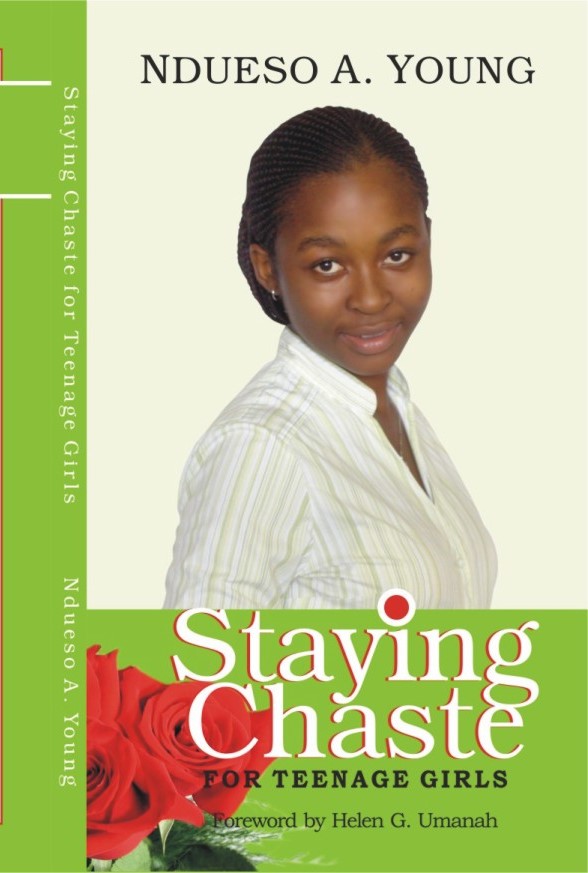 Cover page of Staying Chaste written by Ndueso Young.
Cover page of Staying Chaste written by Ndueso Young.
You have authored Staying Chaste and More Than Just a Girl, what else should we expect?
Okay, I’m working on Thrive Codes, and Secrets of Becoming a Relentless Girl. We are in the age of acceleration and social media has come to stay and there is a lot of pressure on females to be part of a circle to maintain a lifestyle that is sometimes out of their reach. There is a lot of such pressure going on, so, Thrive Codes, comes to tell the young lady that beyond the thrills and frills of social media, you can live your life and conquer this pressure, and the way to go is being authentic. When you’re your authentic self a lot of things will not move you. We want to help young girls come to a point of self evolution, that you don’t have to be in a circle and live a lifestyle defined for you by social media before you can make it in life. Thrives Codes, is not a book per se, it’s a number of short codes to guide the day-to-day actions of the girl child.
It’s obvious you spend a lot of time writing and sensitizing young girls, how do you relax?
Ahh! I relax a lot. I’m a very private person.
What do you mean by being a “very private person”?
(Laughter) What I mean is that I may be having fun but the rest of the world would not know. I really don’t put out my personal life on social media. I relax a lot. I dance, swim, converse with family members and friends. You won’t really see this part of me outside there.
Okay. I’ll like to come to Odio community, to watch you dance itembe someday if you’ll give me an invitation.
(Giggling)
Thank you very much for accepting to speak with me.
Your are welcome.






